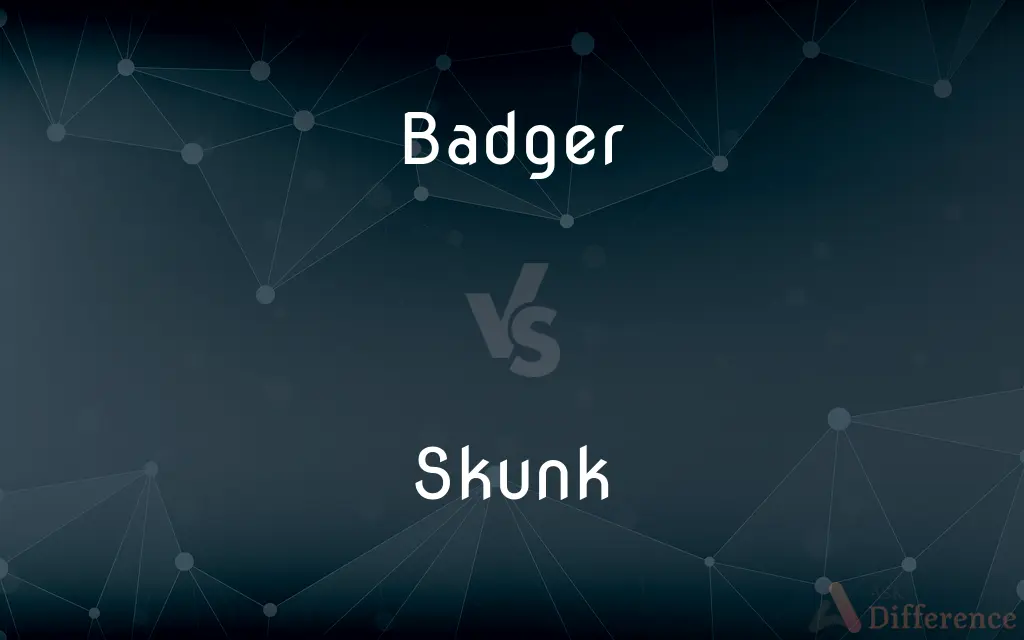Badger vs. Skunk — What's the Difference?
By Tayyaba Rehman & Fiza Rafique — Updated on September 12, 2023
A badger is a burrowing mammal known for its tenacity and belongs to the family Mustelidae. A skunk is also a mammal but is famous for its ability to spray a foul-smelling liquid as a defense mechanism and belongs to the family Mephitidae.

Difference Between Badger and Skunk
Table of Contents
ADVERTISEMENT
Key Differences
A badger is a stout, burrowing mammal belonging to the family Mustelidae and is known for its tough, tenacious nature. In contrast, a skunk is also a mammal but belongs to the family Mephitidae and is famous for its unique defense mechanism, which involves spraying a foul-smelling liquid.
Badgers usually have a grayish coat with distinctive black and white facial markings. Skunks typically have black fur with a white stripe or series of stripes running down their back. While the appearance of both animals can serve as camouflage, the skunk's coloring also serves as a warning to predators.
Badgers are carnivorous and often consume a diet of small animals, roots, and tubers. Skunks are omnivores and have a more varied diet that includes insects, small animals, and plant matter. While both animals are mainly nocturnal, badgers are more inclined to be social and live in family groups called clans.
Badgers often dig complex underground burrow systems called setts, which can be quite expansive. Skunks, on the other hand, may occupy abandoned burrows but generally do not dig extensive tunnel systems themselves. Both animals, however, are skilled at using their environment for protection and shelter.
Both badgers and skunks have cultural significance in various societies. The badger is often admired for its tenacity and courage, while the skunk is usually associated with repulsion due to its smell. In folklore and mythology, badgers are often seen as wise and cunning, while skunks are often portrayed as tricksters.
ADVERTISEMENT
Comparison Chart
Family
Mustelidae
Mephitidae
Coat Color
Grayish with markings
Black with white stripes
Diet
Carnivorous
Omnivorous
Social Behavior
Lives in clans
Generally solitary
Burrowing
Digs complex setts
Uses abandoned burrows
Compare with Definitions
Badger
A burrowing mammal belonging to the Mustelidae family.
The badger dug a sett in the hillside.
Skunk
A mammal known for its defensive spray.
The skunk sprayed when it felt threatened.
Badger
An animal that often lives in social groups called clans.
A clan of badgers shared the expansive burrow system.
Skunk
A member of the Mephitidae family.
The skunk is a close relative of stink badgers.
Badger
A primarily carnivorous mammal.
The badger hunted a small rabbit for its meal.
Skunk
A generally solitary animal.
The skunk preferred to roam alone at night.
Badger
A creature with distinct black and white facial markings.
The badger's face almost looked like a mask.
Skunk
An animal with black fur and white stripes.
The skunk's stripes serve as a warning signal.
Badger
An animal known for its tenacious and tough behavior.
The badger stood its ground against a fox.
Skunk
An omnivorous creature.
The skunk ate both plants and small insects.
Badger
Badgers are short-legged omnivores mostly in the family Mustelidae (which also includes the otters, polecats, weasels, and ferrets), but also with two species called "badgers" in the related family Mephitidae (which also includes the skunks). Badgers are a polyphyletic grouping, and are not a natural taxonomic grouping: badgers are united by their squat bodies, adapted for fossorial activity.
Skunk
Skunks are New World mammals in the family Mephitidae. While related to polecats and other members of the weasel family, skunks have as their closest Old World relatives the stink badgers.
Badger
Any of several carnivorous burrowing mammals of the family Mustelidae, such as Meles meles of Eurasia or Taxidea taxus of North America, having short legs, long claws on the front feet, and a heavy grizzled coat.
Skunk
A cat-sized American mammal of the weasel family, with distinctive black-and-white striped fur. When threatened it squirts a fine spray of foul-smelling irritant liquid from its anal glands towards its attacker.
Badger
The fur or hair of any of these mammals.
Skunk
Short for skunkweed
Badger
Any of several similar mammals, such as the ratel.
Skunk
Defeat (someone) overwhelmingly in a game or contest, especially by preventing them from scoring at all
I knew he was a good fisherman, but I didn't expect him to skunk you
Badger
To ask or nag (someone) about something in an annoying and persistent way; pester
Badgered the boy into cleaning his room.
Skunk
Fail to pay (a bill or creditor)
He made a practice of skunking hotels
Badger
Any mammal of three subfamilies, which belong to the family Mustelidae: Melinae (Eurasian badgers), Mellivorinae (ratel or honey badger), and Taxideinae (American badger).
Skunk
Any of several small omnivorous mammals of the Americas belonging to the family Mephitidae, having a bushy tail and black fur with white markings and ejecting a foul-smelling oily liquid from glands near the anus when threatened.Also called polecat.
Badger
A native or resident of the American state, Wisconsin.
Skunk
The glossy black and white fur of any of these mammals.
Badger
(obsolete) A brush made of badger hair.
Skunk
(Slang)A person regarded as obnoxious or despicable.
Badger
A crew of desperate villains who robbed near rivers, into which they threw the bodies of those they murdered.
Skunk
(Slang)Marijuana.
Badger
(obsolete) An itinerant licensed dealer in commodities used for food; a hawker; a huckster; -- formerly applied especially to one who bought grain in one place and sold it in another.
Skunk
To spray with the foul-smelling liquid of a skunk:The dog got skunked.
Badger
To pester; to annoy persistently; to press.
He kept badgering her about her bad habits.
Skunk
To defeat overwhelmingly, especially by keeping from scoring.
Badger
An itinerant licensed dealer in commodities used for food; a hawker; a huckster; - formerly applied especially to one who bought grain in one place and sold it in another.
Skunk
To cause to have no success trying to catch fish. Used in the passive.
Badger
A carnivorous quadruped of the genus Meles or of an allied genus. It is a burrowing animal, with short, thick legs, and long claws on the fore feet. One species (Meles meles or Meles vulgaris), called also brock, inhabits the north of Europe and Asia; another species (Taxidea taxus or Taxidea Americana or Taxidea Labradorica) inhabits the northern parts of North America. See Teledu.
Skunk
To cheat (someone).
Badger
A brush made of badgers' hair, used by artists.
Skunk
To fail to pay (an amount due).
Badger
To tease or annoy, as a badger when baited; to worry or irritate persistently.
Skunk
Any of various small mammals, of the family Mephitidae, native to North and Central America, having a glossy black with a white coat and two musk glands at the base of the tail for emitting a noxious smell as a defensive measure.
Badger
To beat down; to cheapen; to barter; to bargain.
Skunk
A despicable person.
Badger
Sturdy carnivorous burrowing mammal with strong claws widely distributed in the northern hemisphere
Skunk
Anything very bad; a stinker.
Badger
Annoy persistently;
The children teased the boy because of his stammer
Skunk
(slang) A walkover victory in sports or board games, as when the opposing side is unable to score.
Badger
Persuade through constant efforts
Skunk
(cribbage) A win by 30 or more points. (A double skunk is 60 or more, a triple skunk 90 or more.)
Skunk
A member of a hybrid skinhead and punk subculture.
Skunk
(slang) skunkweed.
Skunk
Any of the strains of hybrids of Cannabis sativa and Cannabis indica that may have THC levels exceeding those of typical hashish.
Skunk
To defeat so badly as to prevent any opposing points.
I skunked him at cards.
We fished all day but the lake skunked us.
Skunk
(cribbage) To win by 30 or more points.
Skunk
To go bad, to spoil.
Skunk
Any one of several species of American musteline carnivores of the genus Mephitis and allied genera. They have two glands near the anus, secreting an extremely fetid liquid, which the animal ejects at pleasure as a means of defense.
Skunk
In games of chance and skill: To defeat (an opponent) (as in cards) so that he fails to gain a point, or (in checkers) to get a king.
Skunk
A person who is deemed to be despicable or contemptible;
Only a rotter would do that
Kill the rat
Throw the bum out
You cowardly little pukes!
The British call a contemptible person a `git'
Skunk
A defeat in a game where one side fails to score
Skunk
Street names for marijuana
Skunk
American musteline mammal typically ejecting an intensely malodorous fluid when startled; in some classifications put in a separate subfamily Mephitinae
Skunk
Defeat by a lurch
Common Curiosities
Are badgers and skunks nocturnal?
Both animals are mainly nocturnal, being most active during the night.
Do badgers live in groups?
Yes, badgers often live in social groups called clans.
Do both animals burrow?
Badgers are known for their complex burrowing, while skunks may occupy abandoned burrows.
What regions are badgers found in?
Badgers are found in various parts of North America, Europe, and Asia.
How do badgers protect themselves?
Badgers rely on their strong bodies and sharp claws for protection.
How do skunks protect themselves?
Skunks use their defensive spray to deter predators.
What is a Badger?
A badger is a burrowing mammal belonging to the family Mustelidae.
What is a Skunk?
A skunk is a mammal known for its ability to spray a foul-smelling liquid, belonging to the family Mephitidae.
What do skunks eat?
Skunks are omnivores, consuming both plant matter and small animals.
Do badgers have a defensive spray like skunks?
No, badgers do not have a defensive spray like skunks.
Are badgers carnivorous?
Yes, badgers are primarily carnivorous, eating small animals and some plant matter.
What is the primary coloration of a badger's coat?
Badgers typically have a grayish coat with black and white facial markings.
Are skunks social animals?
Skunks are generally solitary animals.
Where can you find skunks?
Skunks are mainly found in the Americas.
What color are skunks?
Skunks are generally black with white stripes or patterns.
Share Your Discovery

Previous Comparison
Satirize vs. Satirise
Next Comparison
Drink vs. GuzzleAuthor Spotlight
Written by
Tayyaba RehmanTayyaba Rehman is a distinguished writer, currently serving as a primary contributor to askdifference.com. As a researcher in semantics and etymology, Tayyaba's passion for the complexity of languages and their distinctions has found a perfect home on the platform. Tayyaba delves into the intricacies of language, distinguishing between commonly confused words and phrases, thereby providing clarity for readers worldwide.
Co-written by
Fiza RafiqueFiza Rafique is a skilled content writer at AskDifference.com, where she meticulously refines and enhances written pieces. Drawing from her vast editorial expertise, Fiza ensures clarity, accuracy, and precision in every article. Passionate about language, she continually seeks to elevate the quality of content for readers worldwide.















































